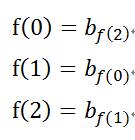Function
Time Limit: 4000/2000 MS (Java/Others) Memory Limit: 131072/131072 K (Java/Others)Total Submission(s): 934 Accepted Submission(s): 420
Problem Description
You are given a permutation
a
from
0
to
n−1
and a permutation
b
from
0
to
m−1
.
Define that the domain of function f is the set of integers from 0 to n−1 , and the range of it is the set of integers from 0 to m−1 .
Please calculate the quantity of different functions f satisfying that f(i)=bf(ai) for each i from 0 to n−1 .
Two functions are different if and only if there exists at least one integer from 0 to n−1 mapped into different integers in these two functions.
The answer may be too large, so please output it in modulo 109+7 .
Define that the domain of function f is the set of integers from 0 to n−1 , and the range of it is the set of integers from 0 to m−1 .
Please calculate the quantity of different functions f satisfying that f(i)=bf(ai) for each i from 0 to n−1 .
Two functions are different if and only if there exists at least one integer from 0 to n−1 mapped into different integers in these two functions.
The answer may be too large, so please output it in modulo 109+7 .
Input
The input contains multiple test cases.
For each case:
The first line contains two numbers n, m . (1≤n≤100000,1≤m≤100000)
The second line contains n numbers, ranged from 0 to n−1 , the i -th number of which represents ai−1 .
The third line contains m numbers, ranged from 0 to m−1 , the i -th number of which represents bi−1 .
It is guaranteed that ∑n≤106, ∑m≤106 .
For each case:
The first line contains two numbers n, m . (1≤n≤100000,1≤m≤100000)
The second line contains n numbers, ranged from 0 to n−1 , the i -th number of which represents ai−1 .
The third line contains m numbers, ranged from 0 to m−1 , the i -th number of which represents bi−1 .
It is guaranteed that ∑n≤106, ∑m≤106 .
Output
For each test case, output "
Case #
x
:
y
" in one line (without quotes), where
x
indicates the case number starting from
1
and
y
denotes the answer of corresponding case.
Sample Input
3 2 1 0 2 0 1 3 4 2 0 1 0 2 3 1
Sample Output
Case #1: 4 Case #2: 4
Source
题意:给两个数列a(元素个数为n)和b(元素个数为m),求满足f(i) = b[f(a[i])] 的组合情况有多少种
题解:由第二个样例:

对于这组数来说,假如我们先指定了f(0)对应的在b中的值,那么根据第2个式子,就可以得出f(1),根据f(1)就又可以得出f(2),最后根据f(2)就可以检验f(0)的值是否正确。
这也就是说,对于a中的一个循环节,只要确定了其中一个数所映射的值,那么其它数就都被相应的确定了。

答案就是:当b中的循环节的长度是a的循环节长度的约数的时候,a循环节可以指定数字的个数是b的循环节长度
这里有一个规律就是:0~n 的排列,是一定存在循环节的,而且多个循环节是不会有交叉的,所以最后的结果应该相乘
#include <iostream>
#include <cstdio>
#include <cstring>
#include <string>
#include <algorithm>
#include <map>
#include <cmath>
#include <set>
#include <stack>
#include <queue>
#include <vector>
#include <bitset>
#include <functional>
using namespace std;
#define LL long long
const int INF = 0x3f3f3f3f;
const LL mod = 1e9 + 7;
int n, m;
int a[1000009], b[1000009];
int xa[1000009], xb[1000009];
struct node
{
int x, sum;
}x[1000009], y[1000009];
LL mpow(LL x, LL y, LL p)
{
LL ans = 1;
while (y)
{
if (y & 1) ans = (ans * x) % p;
x = (x * x) % p;
y >>= 1;
}
return ans;
}
int main()
{
int cas = 0;
while (~scanf("%d %d", &n, &m))
{
for (int i = 0; i < n; i++) scanf("%d", &a[i]);
for (int i = 0; i < m; i++) scanf("%d", &b[i]);
int cnt1 = 0, cnt2 = 0;
for (int i = 0; i < n; i++)
{
if (a[i] == -1) continue;
int cnt = 0;
if (a[i] != -1)
{
int k = a[i];
while (a[k] != -1)
{
cnt++;
int kk = k;
k = a[k];
a[kk] = -1;
}
}
xa[cnt1++] = cnt;
}
for (int i = 0; i < m; i++)
{
if (b[i] == -1) continue;
int cnt = 0;
if (b[i] != -1)
{
int k = b[i];
while (b[k] != -1)
{
cnt++;
int kk = k;
k = b[k];
b[kk] = -1;
}
}
xb[cnt2++] = cnt;
}
sort(xa, xa + cnt1);
sort(xb, xb + cnt2);
int tot1 = -1,tot2=-1;
for (int i = 0; i<cnt1; i++)
{
if (i == 0 || xa[i] != xa[i - 1]) x[++tot1].x = xa[i], x[tot1].sum = 1;
else x[tot1].sum++;
}
for (int i = 0; i<cnt2; i++)
{
if (i == 0 || xb[i] != xb[i - 1]) y[++tot2].x = xb[i], y[tot2].sum = 1;
else y[tot2].sum++;
}
LL ans = 1;
for (int i = 0; i <= tot1; i++)
{
LL sum = 0;
for (int j = 0; j <= tot2&&x[i].x>=y[j].x; j++)
if (x[i].x % y[j].x == 0) sum = (sum + 1LL * y[j].x * y[j].sum) % mod;
ans = (ans * mpow(sum, x[i].sum, mod)) % mod;
}
printf("Case #%d: %lld\n", ++cas, ans);
}
return 0;
}









 探讨给定两个排列a和b时,如何计算满足特定条件f(i)=b(f(a[i]))的不同函数f的数量。通过分析循环节特性,利用约数关系进行有效计算。
探讨给定两个排列a和b时,如何计算满足特定条件f(i)=b(f(a[i]))的不同函数f的数量。通过分析循环节特性,利用约数关系进行有效计算。

















 被折叠的 条评论
为什么被折叠?
被折叠的 条评论
为什么被折叠?








